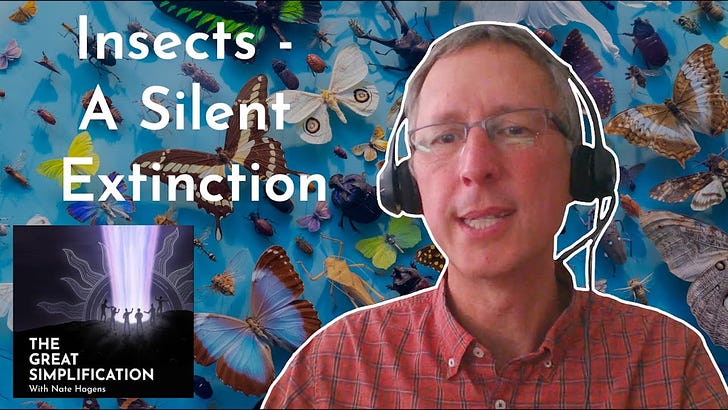This week…
Today, Professor Nick Haddad, a conservation scientist with a focus on butterflies and other insects, joins me to discuss what decades of research have indicated about the declining state of insect populations. These creatures - often considered pests - act as the foundation of critical ecosystem functions. The overlooked degradation of butterflies, beetles, bees, ants, ladybugs, and countless other species have huge ripple effects across our local and global ecological functions - from a loss of bird populations to a reduced ability to grow food. Nick and I unpack the full scope of this decline and what it might mean for humans, other animals, and the biosphere.
Professor Nick Haddad is co-lead of the Long Term Ecological Research site at Kellogg Biological Station at Michigan State University. He leads decades-long, landscape-scale experiments that bring scientific principles to conservation actions. He studies how landscape diversity, including prairie strips through croplands, affect biodiversity, especially of plants and insects, and of ecosystem services including pollination, biocontrol, and decomposition. For three decades he has led the world’s largest experiment testing the role of landscape corridors in increasing dispersal of most plant and animal species, and increasing plant diversity. He has conducted long-term restoration experiments to guide conservation of rare butterflies in the face of climate and land use change. Nick brings together ideas in science and management through ConservationCorridor.org.
Why are we not more concerned about the health and vitality of these critical organisms? Can humans - or life as we know it - survive without these little creatures? What can we do as individuals, businesses, and governments to help insects rebound as quickly as possible, and in turn strengthen the health of everything else.
In case you missed it…
Last week, I was joined by Sian Sutherland, a leader in the movement towards reducing the overconsumption of plastic and its waste. The modern era is dependent on fossil fuels for many reasons - one of the most covertly ubiquitous ones being plastic. Everyday we are surrounded by it - encasing our food, woven in the threads of our clothes, and even permeating into the water that we drink. Simultaneously, more and more human health and environmental consequences of plastic pollution are being discovered, calling for the need to be more thoughtful in the way we use this indestructible material.
If you appreciate The Great Simplification podcast…
Be sure to leave a review on your preferred podcast platform! Leaving reviews helps the podcast grow, which helps spread awareness of our systemic situation from experts in ecology, energy, policy, economics, technology, and community building so that we can better understand - and respond to - the challenges of the coming decade.
The Great Simplification podcast is produced by The Institute for the Study of Energy and Our Future (ISEOF), a 501(c)(3) organization. We want to keep all content completely free to view globally and without ads. If you’d like to support ISEOF and it’s content via donation, please use the link below.






Check out Homegrown National Park, homegrownnationalpark.org/about, and National Wildlife Fund's plant finder, nwf.org/NativePlantFinder/search. Both were founded by Professor Doug Tallamy (whom you might want to have on your show). The idea behind Homegrown National Park is for individuals to plant pollinator and bird supporting native plants, no matter how small a space they have to offer. A planter on an urban apartment balcony, a garden patch in the back of a condo with strict HOA rules, a garden in front of a suburban home, or some larger rural stretch, all count. We cannot protect enough land for wildlife, and we need corridors between protected areas. The NWF native plant finder tells the set of pollinators that each plant supports, and the plants that support each pollinator, local to your zip code. If you can't find a plant for your zip code there, check bonap.net/tdc, which has a more complete database, but doesn't tell you the pollinator relationships.